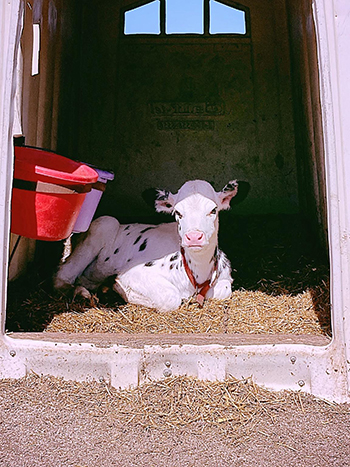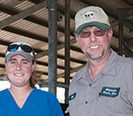
I was once told by a vet, “The scours didn't kill your calf, you did.” I was completely appalled at the fact that he had just accused me of letting my calf die. But after some digging and thinking about what he said, I came to the realization that it was absolutely true.
He wasn't necessarily saying that I went out and deliberately killed my calf, but I was looking in so many directions that I completely missed the point as to why my calf died. Yes, she had scours. Yes, she was extremely sick. Yes, I was trying to find the best drug out there that would cure her immediately because I was having issues with several of the calves at the time. However, the pure fact was that I was missing a very vital point.
The point is that calves do occasionally get scours, and there is nothing you can do once they come down with it except nourishment. That is what they are seeking, not a magical drug.
When a calf has scours, it becomes weak and vulnerable. So, when you’re looking for that magical treatment in most scours cases, you will not find it. The calf is pushing out more fluids than it is taking in. Here in the south, it's hot, they're thirsty, and calves can get extremely dehydrated when scours occur. It’s just a matter of time before you have lost the calf — not to scours, but to dehydration.
In the hutches, we keep our calves watered all day and their buckets are filled to the brim, but when a calf is sick from scours, this isn’t enough. They aren't going to feel like getting up to drink out of their pail in the hutch. They’re not going to feel like doing anything, really. This is where the magical drug of choice doesn’t fit. When you think a scours pill will do the trick, it usually won’t, or at least not by itself. Yes, the scours is wreaking havoc on their little digestive systems, but more importantly, dehydration is doing the most damage.
It’s not that I didn’t understand that they needed more hydration while sick — that's common sense. It was the realization that some calves are dehydrated to the point where an electrolyte packet once a day wasn't going to do the job. Not even a second dose of electrolytes in a bottle of water will do the trick in keeping them hydrated. Sometimes it takes checking on them three to five times a day and getting them water, Nulife, Gatorade, or some other type of rehydrating fluid. Some nourishment every 2 to 3 hours is not a bad idea. Occasionally, I have my night shift check on them and give them a little more overnight, too.
I have learned over time that once we spot a calf with scours, there are three very vital steps to get her back to top-notch health:
- Isolation: Relocate her. This not only pulls her away from the environment that she normally beds down in, but it also moves her away from any nearby calves so that spreading is minimalized.
- Cleanliness: Keep moving her hutch or pen area, or dig out the old bedding and replace it with fresh bedding. It does no good trying to get her healthy as she lays down in the same bacteria you're trying to cure her from.
- Hydration, hydration, hydration: Keep her hydrated, and ensure more fluids are going in than coming out.
Scours will run its course. If you stay ahead of it, you will more than likely end up with a good outcome.

Mark and Caitlin Rodgers are dairy farmers in Dearing, Georgia. The Rodgers have a 400-cow dairy that averages 32,000 pounds of milk. Follow their family farm on Facebook at Hillcrest Farms Inc.